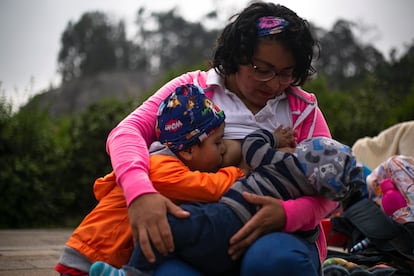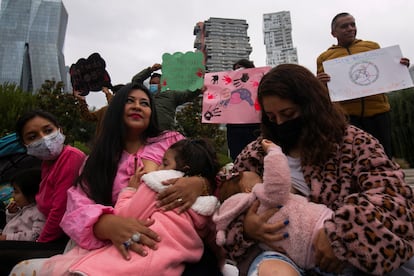Why breastfeeding in Mexico still faces social stigma
Only 28.8% of children under six months are exclusively breastfed, but seven out of 10 have consumed some milk formula or substitute


Denisse, 31, knew that having a baby was going to be hard work, but she didn’t think for a minute that she would have to contend with obstacles like her own family complicating something as simple as breastfeeding. “My husband is older than me and from the beginning, when the subject came up, he told me, ‘I don’t want you to go around showing your boobs in the street,’” she says. “It was the same with my mother. She told me to cover up, but a baby doesn’t let you cover up when you are feeding.”
Although there are numerous articles and campaigns in favor of breastfeeding in Mexico, not to mention the fact that it is globally recognized as the best way to feed babies during their first few months in the world, taboos and myths still get in the way. According to the most recent National Nutrition and Health Survey, only 28.8% of children under six months of age are exclusively breastfed in Mexico. On the other hand, at least seven out of 10 have consumed formula or a breast milk substitute.
The first hours after birth are crucial for babies in terms of food, with breastmilk strongly recommended by the World Health Organization (WHO). “There is both social and medical pressure [against it], especially for new mothers and, although it is physiologically natural, it can present a major challenge for women,” says Julieta Ponce Sánchez, a nutritionist at the Food Orientation Center in Mexico.
Breastfeeding in the first hours of a baby’s life is not always possible due to hospital protocols established by Mexico’s health system. New mum Laura, who gave birth 14 months ago, recalls the nurses taking her daughter away and not allowing her to see her baby until the following day. “They told me they were going to give her formula to regulate her glucose levels, even though I knew that the best thing to do was to breastfeed her,” she says. Although she was able to breastfeed some hours later, she believes the protocol was wrong. “We went to a private hospital believing that they would let me feed her, but in the end it was the same as a public one.”
Both Denisse and Laura returned home with a prescription for milk formula and a recommendation that they alternate breastfeeding with formula. According to data from the organization Consumer Power, household spending on breast milk substitutes ranges from between $40 and $100 a month.

“Remember, formula has to be made with water, and we ignore the quality of the water it’s being made with,” says Ponce. “Imagine what happens in the poorest homes, in remote communities, where the quality of the water is questionable. We are doubling the risk of infectious diseases and, also, tripling the costs for mothers and families.”
Recommendations from pediatricians also play a key role in substituting breastmilk with formula. Carmen went back to work three months after giving birth, and struggled to get her son to accept the breast in the evenings. “His doctor told me that the best thing to do was to give him formula and that he would still have the protection from his first three months breastfeeding,” she says. According to the WHO International Code of Marketing of Breastmilk Substitutes, a pediatrician should recommend milk formula only in the event of health issues whether these pertain to the mother or baby; however, half the doctors in Mexico recommend formula, irrespectively.
This is curious given that the quality of formula milk continues to be suspect. Mexico’s Office of the Federal Prosecutor for the Consumer (Profeco) conducted a study of formula and flagged up the brands Enfagrow promental, Enfamil lactose-free, Enfamil promental, Nutramigen Premium and SMA Comfort Gold as containing excess corn syrup, “which can boost, among other things, the baby’s desire for the formula,” according to the report.
Allowances in the workplace for breastfeeding mothers is an issue still pending in Mexico’s labor legislation. Verónica Esparza, research coordinator for the Information Group on Reproductive Choice (GIRE), considers that the responsibility for successful breastfeeding does not lie exclusively with the woman, but also on the conditions that facilitate it. “There are international labor standards that Mexico has not ratified,” she says. “For example, Convention 183 on maternity protection, which provides for maternity leave of at least 14 weeks and bans the dismissal of or discrimination against women on any grounds related to their pregnancy or the birth of their child or breastfeeding.”
Sexualization
Thalía gave birth six months ago, and while she rarely leaves her house, when she does, she prefers to find a private corner in which to feed her son. “Personally, I don’t like to breastfeed in public, but if I have to, I cover up, because it’s very personal,” she says. Denisse also has to seek out private spaces in order to feed her son when in public with her family. “If we go out, I prefer to stay in the parking lot and then go to the restaurant or wherever we go,” she says.
Breastfeeding anxiety is one of the most common syndromes among nursing mothers. “We women carry a double or triple burden because we are the ones who gestate and we are the ones who breastfeed,” says Ponce.
There are several cases of women who have faced discrimination for feeding their babies in public, despite the fact that a survey carried out by the Public Opinion Center of the Valle de México University, showed that 95% would not feel uncomfortable if they saw a woman breastfeeding in public. However, 46% of men said that if a woman in their family were breastfeeding in public they would prefer her to cover up and 87% of women said that if they had to breastfeed in public they would prefer to cover their breasts.
Much of the rejection comes from the misconception that breastfeeding is exhibitionist, immoral or dirty. “The sexualization of breasts is also deeply rooted,” says Ponce. “It’s not just about whether a woman decides to breastfeed or not, but that breastfeeding has been turned into something holy. There is still a lot of work to be done as a society for breastfeeding to be seen as what it is: something perfectly normal.”
Tu suscripción se está usando en otro dispositivo
¿Quieres añadir otro usuario a tu suscripción?
Si continúas leyendo en este dispositivo, no se podrá leer en el otro.
FlechaTu suscripción se está usando en otro dispositivo y solo puedes acceder a EL PAÍS desde un dispositivo a la vez.
Si quieres compartir tu cuenta, cambia tu suscripción a la modalidad Premium, así podrás añadir otro usuario. Cada uno accederá con su propia cuenta de email, lo que os permitirá personalizar vuestra experiencia en EL PAÍS.
¿Tienes una suscripción de empresa? Accede aquí para contratar más cuentas.
En el caso de no saber quién está usando tu cuenta, te recomendamos cambiar tu contraseña aquí.
Si decides continuar compartiendo tu cuenta, este mensaje se mostrará en tu dispositivo y en el de la otra persona que está usando tu cuenta de forma indefinida, afectando a tu experiencia de lectura. Puedes consultar aquí los términos y condiciones de la suscripción digital.








































